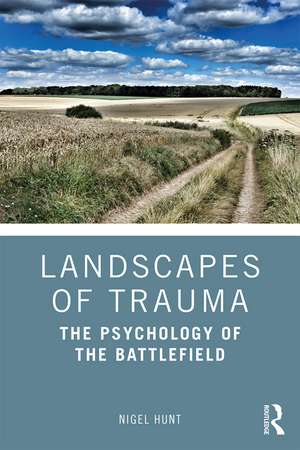Landscapes of Trauma: The Psychology of the Battlefield
Autor Nigel Hunten Limba Engleză Hardback – 20 aug 2019
Hunt explores how war shapes the nature of trauma, not only by its innate horror but also by the historical and societal contexts it is fought in, from the cultural and social conventions of the period to the topography of the settings. This book provides a deep analysis of how war is experienced and remembered in different eras and by different generations. Moving beyond the clinical concept of post-traumatic stress disorder, Hunt discusses how trauma can be understood socially and historically, as well as through the lens of individual suffering. This book also investigates the psychological foundations of memorialisation, remembrance and commemoration that shape the legacy of the battles discussed.
Using interviews with veterans, their letters, journals and diaries, as well as literary and historical sources, Hunt locates the battlefield as a place where humans explore the parameters of human behaviour, thought and emotion. This book is in important resource for students and scholars interested in the psychology of trauma and war, as well as military history.
| Toate formatele și edițiile | Preț | Express |
|---|---|---|
| Paperback (1) | 369.73 lei 6-8 săpt. | |
| Taylor & Francis – 19 aug 2019 | 369.73 lei 6-8 săpt. | |
| Hardback (1) | 837.70 lei 6-8 săpt. | |
| Taylor & Francis – 20 aug 2019 | 837.70 lei 6-8 săpt. |
Preț: 837.70 lei
Preț vechi: 1021.59 lei
-18% Nou
Puncte Express: 1257
Preț estimativ în valută:
160.33€ • 166.76$ • 134.36£
160.33€ • 166.76$ • 134.36£
Carte tipărită la comandă
Livrare economică 13-27 martie
Preluare comenzi: 021 569.72.76
Specificații
ISBN-13: 9781138287716
ISBN-10: 1138287717
Pagini: 230
Dimensiuni: 156 x 234 x 18 mm
Greutate: 0.48 kg
Ediția:1
Editura: Taylor & Francis
Colecția Routledge
Locul publicării:Oxford, United Kingdom
ISBN-10: 1138287717
Pagini: 230
Dimensiuni: 156 x 234 x 18 mm
Greutate: 0.48 kg
Ediția:1
Editura: Taylor & Francis
Colecția Routledge
Locul publicării:Oxford, United Kingdom
Public țintă
General, Postgraduate, Professional, and UndergraduateCuprins
Preface
Chapter 1 - Introduction
Chapter 2 - Methods used in the book
Chapter 3 - The psychological impact of battle
Chapter 4 - Memorialisation, remembrance and commemoration
Chapter 5 - The landscape of battle
Chapter 6 - The Hundred Years War
Chapter 7 - The British Civil Wars: Wingfield Manor
Chapter 8 - Ciudad Rodrigo and Salamanca: The Peninsular War
Chapter 9 - Waterloo
Chapter 10 - The Crimean War
Chapter 11 - The Franco-Prussian War: The Battle of Sedan
Chapter 12 - World War One and the Western Front
Chapter 13 - The Spanish Civil War and the Battle of the Ebro
Chapter 14 - The Battle of Normandy
Chapter 15 - Reflections
References
Index
Chapter 1 - Introduction
Chapter 2 - Methods used in the book
Chapter 3 - The psychological impact of battle
Chapter 4 - Memorialisation, remembrance and commemoration
Chapter 5 - The landscape of battle
Chapter 6 - The Hundred Years War
Chapter 7 - The British Civil Wars: Wingfield Manor
Chapter 8 - Ciudad Rodrigo and Salamanca: The Peninsular War
Chapter 9 - Waterloo
Chapter 10 - The Crimean War
Chapter 11 - The Franco-Prussian War: The Battle of Sedan
Chapter 12 - World War One and the Western Front
Chapter 13 - The Spanish Civil War and the Battle of the Ebro
Chapter 14 - The Battle of Normandy
Chapter 15 - Reflections
References
Index
Notă biografică
Nigel Hunt is an Associate Professor at the University of Nottingham. He is a Docent in Social Psychology in the Swedish School of Social Sciences, University of Helsinki. He is a Chartered Health Psychologist (HCPC Practitioner), and an Associate Fellow of the British Psychological Society, a Fellow of the Royal Historical Society and a Senior Fellow of the Higher Education Academy.
Descriere
Integrating trauma studies with historical research and social psychology, Landscapes of Trauma examines a range of battlefields from across history, including Waterloo, the Battle of Sedan, the Battle of the Ebro, and the Battle of Normandy, to bring to light what these battlefields say about our collective and individual psyches.
